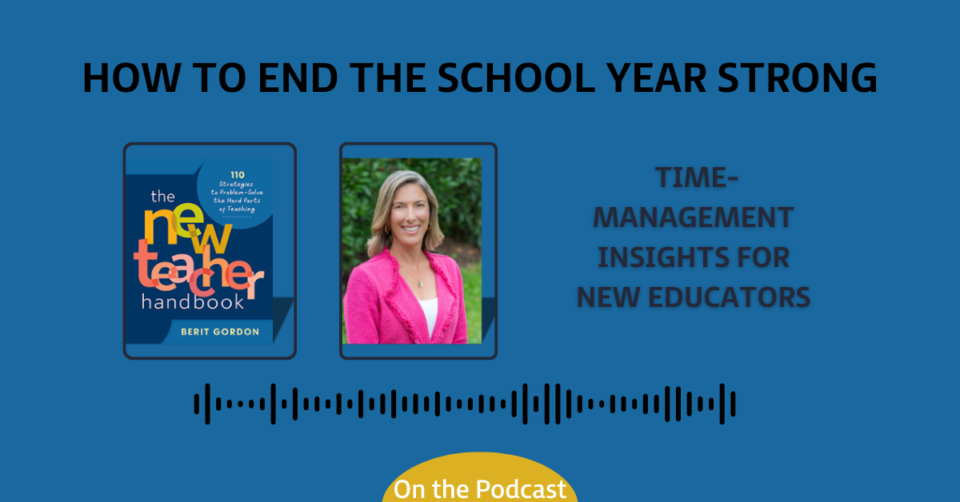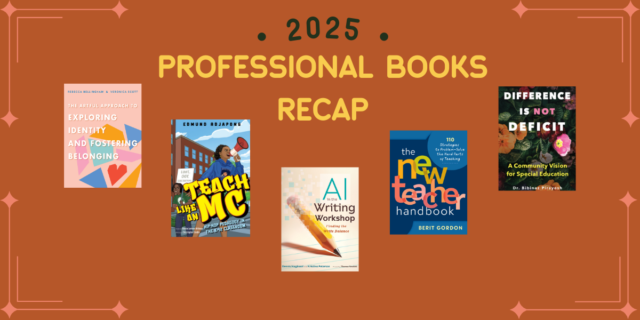
Today we have another episode in Berit Gordon's series Tips for New Teachers. In this episode, she tackles the challenges of balancing the never-ending tasks and pacing units to finish the year strong by setting firm end dates for your units and prioritizing key concepts. Join us as we explore practical strategies to help you stay focused, maintain your well-being, and end the school year on a high note.
Berit's forthcoming book The New Teacher Handbook if full of strategies like these!
Transcript
Berit Gordon:
Hey, fellow teachers. It's May, which means we're all running on fumes and we're all dreaming of summer, and we're also wondering how we're going to get through to the end of the year. And listen, a perfectly acceptable coping mechanism is duck your head and run and you'll get to the end of the year. That's okay, but we can probably do a little bit better than that. So I'm going to share a couple strategies. One is about how to manage the workload when it feels like it's never going to get done. And the other one is how to pace your units so you can end things on time and not feel like your students got shorted on a whole bunch of content that you never got to cover.
First, be realistic. The workload is never going to get done. So part of it is just accepting that, that you'll never feel like, oh, I'm totally finished. I now can go watch a show or do whatever. Know that there will always be another paper to grade, another lesson to plan, another email to answer. But here's some things to try. First of all, set firm end times for tasks and stick to them. So for instance, you might know that your lesson plans could take 45 minutes. So set a timer for that and then when the 45 minutes is up, you're done. I know that a lot of tasks for me can suddenly take three hours, but the fact is my students don't really notice that much of a difference between my perfect lesson plan and my good enough lesson plan. But who does notice the difference? My family, my friends, my physical health because I made sure to protect time to make sure I'm still getting sleep and I'm showing up the next day feeling rested and energized. So set firm end time and stick to it.
Another one is the Pomodoro Technique. You tend to get diminishing returns when you try to hyper focus on a task for too long. We tend to really be productive for about 25 minutes and then we need a short break. So again, just set a timer and when the timer goes off, you take a quick break and then you can reset it. It also can help you just focus when you know that timer is just a little bit longer. The timer tends to go off for me and I think, oh, I can't believe how much I got done. And then I actually want to set it again. This one might sound weird, but find a parallel play work partner. Sometimes just sitting in a room with somebody and having them also get work done helps us feel a little accountable and stay focused.
So find a colleague who will sit in your classroom with you after school one or two days a week and you both just get your own stuff done. It's like having a gym partner, but for work. If I go take a class at the gym and there's a whole bunch of other people working out, I'm less likely to just get out my phone and start scrolling. So try that one. There's also some great videos online that you can find of just watching somebody else get work done. Even playing that sometimes can help us stay focused. Now, let's talk really briefly about ending units on time because it can be May and you might feel like, oh my gosh, I still have three units I'm supposed to cover. And panic ensues. First of all, it's okay. Put a little note to look at next year to remind yourself about pacing.
But remember, if you have shown students how to learn some really core concepts and they know how to show up in school and learn routines, and they had a positive association of showing up to school, they're doing great. But now thinking about ending units on time, first of all, I want you to pick an end date for this unit right now and stick to it. You're not going to alter it by maybe more than one day on either side. Because the reason why is that when we let units go too long, energy tends to go down, students get fatigued, we're all sick of it. But I know why we do it is because we think, oh my gosh, but they're not good enough yet so I have to teach it longer. But the payoff isn't really there. So pick one or two non-negotiables that you know want them to understand by the end of this unit and let the rest go.
You're going to take out entire concepts and lessons and you're going to tell yourself this I can live with. And then of course, you want to adopt the assessment to make sure that they're only getting assessed on what they were actually taught. Now the beauty is you can still stick to that end date and also students are going to end a unit feeling good because they were assessed on those concepts they really did understand, that they weren't rushed through. And they're going to be more energized to start the next unit. Listen, we all want to be that perfect teacher who covers every standard flawlessly, but remember, perfect is the enemy of good and the enemy of new teachers' mental health and well-being. So it is okay to just accept things as they are, to remember that we're there to be a caring adult for our students. And so set the timer, find a work buddy, pick an end date, stick to it, and tell yourself that what you're doing is good enough. And then you're going to feel good about showing up again next fall.
Edie:
Thanks for tuning in today. And some exciting news, Berit's forthcoming book The New Teacher Handbook is full of tips like these. Head over to blog.heinemann.com to learn more about the book and read a full transcript.
About the Author

Berit Gordon brings many years of teaching experience in New York City schools as well as in the Dominican Republic to her literacy coaching work. She is a graduate and former instructor at Teachers College, Columbia University. Berit is the author of No More Fake Reading, and The Joyful Teacher. Whether running workshops, leading literacy coaching sessions, or working in classrooms, Gordon strives to help students fall in love with reading and writing, and to lay the groundwork so they are experts at both for life. She lives with her family in Maplewood, New Jersey.
You can connect with her on her website at BeritGordon.com.


